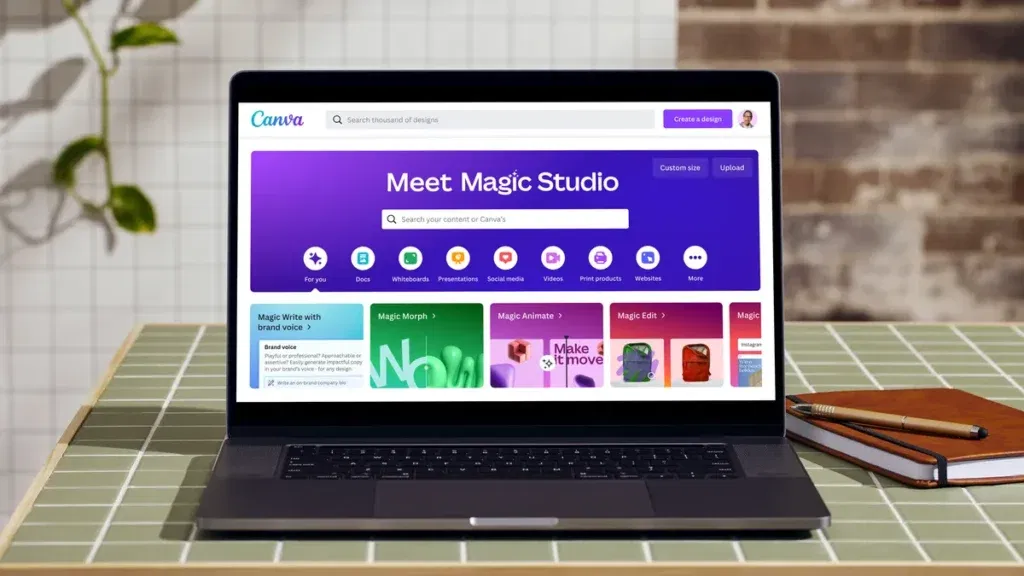
Marketing has undergone a massive transformation in recent years, thanks to the emergence of Artificial Intelligence (AI). Digital marketing strategies have become more efficient and effective for businesses.
AI has the power to analyse large amounts of data, uncover patterns, and generate insights that can transform the way businesses interact with their customers.
From improving customer experience to delivering personalised content, AI is changing the way we approach marketing. The fascinating world of AI is revolutionising the marketing industry.
What is AI (Artificial Intelligence)?
AI is a technology that allows machines to complete tasks that usually require human intelligence, for example, things that involve problem-solving, learning and decision-making.
AI is also referred to as machine learning, as the chatbots improve over time. For example, the more conversations ChatGPT has, the better it becomes for providing its service.
AI-powered tools can automate repetitive tasks, deliver personalised content, and improve customer experience, which enables marketers to optimise their work and use AI to save time.
Businesses analyse customer data, identify patterns and behaviours, and generate insights with AI to inform successful marketing strategies. AI helps businesses discover their customer preferences and interests, in order to suggest products or services that meet their needs.
Key Benefits of AI in Marketing
AI is transforming marketing by providing businesses with the tools they need to understand their customers better and deliver personalised experiences that drive engagement and loyalty.
Enables quick and accurate analysis of vast amounts of data.
AI can process massive amounts of data much faster than humans. This allows businesses to uncover valuable insights and patterns that inform marketing strategies. For example, AI can analyse customer data, including purchase history, social media activity and website behaviour. To identify trends and preferences that can develop targeted marketing campaigns.
Provides valuable insights that inform marketing strategies.
With AI-powered data analysis tools, businesses can gain a better understanding of their customers’ needs and preferences. These insights from AI can inform product development, pricing strategies and marketing messaging.
Delivers personalised content to customers based on their behaviour and interests.
Personalisation is key to engaging customers and driving conversions. AI-powered tools can help businesses deliver personalised content, such as product recommendations and email campaigns, entirely based on customer behaviour and interests. This can increase customer satisfaction and loyalty.
Automates repetitive tasks such as lead scoring, email marketing and social media management.
AI can handle tedious, repetitive tasks, allowing marketers to focus on more strategic work. AI-powered chatbots can easily handle customer inquiries and support, which frees up time for marketers to develop and execute marketing strategies.
Improves customer experience and satisfaction through 24/7 support from AI-powered chatbots.
Chatbots powered by AI can provide quick and accurate responses to customer inquiries and support needs. This reduces waiting time for customers when they need assistance quickly. Chatbots can also gather customer feedback and provide insights without actively gathering information.
Optimises advertising campaigns, reducing ad spend and improving ROI.
AI can help businesses optimise their advertising campaigns by analysing data and adjusting strategies in real-time. For example, AI can automatically adjust ad bids based on conversion rates, reducing ad spend and improving the return on investment for businesses.
Increases efficiency and effectiveness with AI in marketing by providing data-driven insights and automation tools.
AI-powered tools and insights help businesses make more informed decisions and execute more successful marketing campaigns. This leads to improved efficiency and effectiveness in marketing efforts. Resulting in increased revenue and growth for the business.
Cons of AI in Marketing
While AI has the potential to revolutionise marketing, it’s not without its downsides. There are potential drawbacks of using AI in marketing. From concerns around privacy and bias to questions about transparency and the role of creativity, there are many factors to consider when incorporating AI into your marketing strategy.
AI in marketing has less of a personal touch.
Sometimes, using AI in marketing can make it feel like the company isn’t really listening to you. While AI can help automate certain marketing tasks, it may lack the personal touch and emotional connection that human marketers can provide. This could lead to a less engaging customer experience and reduced customer loyalty.
Biassed algorithms.
One concern with AI in marketing is that the algorithms can unintentionally discriminate against certain customer groups. This can happen because the algorithms are trained on biassed data. It’s important to be aware of this potential issue and take steps to mitigate it.
Complexity and cost.
Another issue with AI-powered marketing is that it can be complex and expensive to implement. This could be a drawback for small businesses or those without a large budget.
Over-reliance on data and technology.
While data-driven strategies can be effective, relying too heavily on AI and technology could lead to a narrow focus on measurable outcomes at the expense of creativity and long-term brand building. It’s important to strike a balance between using data and technology and maintaining a human touch in marketing.
There’s a lack of transparency with AI in marketing.
The inner workings of AI algorithms can be difficult to understand, which can make it hard to identify potential biases or how decisions are being made. It’s important to strive for transparency in AI-powered marketing to build trust with customers.
The privacy concerns.
The use of AI in marketing raises concerns about data privacy and security. As customers may be uncomfortable with their data being collected and analysed in detail. Businesses should take steps to protect customer data and be transparent about how it’s being used.
Finding the Balance with Using AI in Marketing
The use of AI in marketing can offer many benefits, including improved efficiency, greater personalisation, and enhanced customer experiences.
However, it’s important to be aware of the negatives as well as the positives. By striking a balance between using AI and maintaining a human touch in your marketing, you can leverage the power of technology while still building strong, lasting relationships with your customers.
If you’re looking for more tips on using AI in your marketing strategy, be sure to check out our previous blog here.
Or if you’re interested in boosting your marketing strategy, reach out to us! Chameleon are industry experts, so don’t hesitate to give us a call or get in touch through our contact page.
Sections:
Share This Content
More Chameleon Insights
- Chameleon Updates
- General
Happy New Year – Will 2026 Be the Year Your Business Grows?
A new year always brings optimism, ambition, and big plans. But as we move into 2026, many UK businesses are asking a very real question: will this be the year we finally see consistent growth again? Since COVID, trading conditions have been tough. Add to that ongoing UK Government changes, rising operational costs, staffing pressures,…
02 Jan 2026
- Digital Marketing
Is Content Marketing Dead In 2026?
Chameleon explores whether content marketing is dead as we head into 2026.
26 Dec 2025
- Digital Marketing
Google Search Console Adds New Branded Queries Filter
Google Search Console has introduced a brand new feature: the branded queries filter. This latest addition provides users with a new way to filter their website performance. The feature is designed to help you understand your traffic better and what’s driving users to your website by allowing you to differentiate between query types. What is…
12 Dec 2025
- Digital Marketing
How To Optimise For Google’s E-E-A-T Signals
In this blog, we'll explain what Google E-E-A-T signals are, and how you can optimise your website for greater trust and authority.
28 Nov 2025
- Digital Marketing
What Is Generative Engine Optimisation? (GEO)
What is GEO? In this blog, we delve deep into what Geneartive Search Optimisation is, and how it's shaping the future of digital marketing.
17 Nov 2025
- Digital Marketing
How AI Is Changing Content Creation in 2025
Discover how AI is changing content creation in 2025 with Chameleon Web Services. Find out about AI copywriting, social media & video form in our full guide.
30 Oct 2025
- Digital Marketing
- Social Media
- Web Design
Top 10 Canva Tips – What Every Content Creator Should Know
Discover Chameleon Web Services top 10 Canva Tips for content creators. Design eye-catching graphics with ease. Perfect for beginners & pros alike.
16 Oct 2025
- Digital Marketing
Google Removes the ‘&NUM=100’ Parameter: What it Means for Digital Marketing
Google has removed the '&NUM=100' parameter, but what does this mean for digital marketing? Chameleon Web Services unpack the details and how you can adapt.
02 Oct 2025
- Chameleon Updates
- Company
Which company is best for web designing?
When searching online for the best company for web designing services, it’s easy to feel overwhelmed. With thousands of agencies offering everything from “cheap websites” to “luxury digital experiences,” how do you know which one to choose? Of course, we’d say Chameleon Web Services is the best – and here’s why. Experience That Stands the…
02 Sep 2025
- Advertising
- Car Competition
- Chameleon Updates
- Competition
- Google Advertising
- Marketing
- Prize Draw
- SEO
Car Prizes and Competitions
Car Prizes and Competitions Driving Digital Success The world of car prize draws and competitions has exploded in recent years, with names like Dream Car Giveaways, Nitrous Competitions, Omaze, and 7 Days Performance creating huge followings online. Now, with Porsche Club GB launching its very first official prize draw to win a Porsche, the market…
18 Aug 2025
- SEO
Google Ads vs Facebook Ads for Small Businesses: A Guide
Wondering whether Google Ads or Facebook ads would be better for your small business? Read our full breakdown here to find out.
08 Aug 2025
- SEO
Are Your BT Phone Lines Down? How Chameleon Help Keep Businesses Connected
Is your BT phone line not working but your internet is? Yesterday, as you may know, there was a major outage that hit the main providers such as EE, BT, Vodaphone, and more. With EE and BT phone lines not working, as imagined, this impacted millions of people across the country, customers enquiring about services,…
25 Jul 2025













